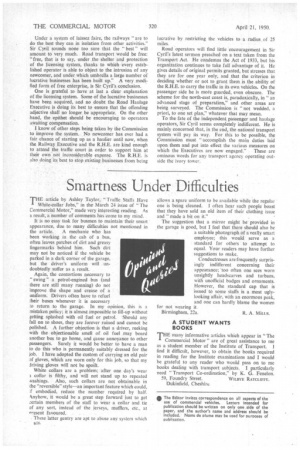Smartness Under Difficulties
Page 50

If you've noticed an error in this article please click here to report it so we can fix it.
THE article by Ashley Taylor, "Traffic Staffs Have White-collar Jobs," in the March 24 issue of "The Commercial Motor," made very interesting reading. As a result, a number of comments has come to my mind. It is no easy task for busmen to maintain their smart appearance, due to many difficulties not mentioned in the article. A mechanic who has been working in the cab of a bus, often leaves patches of dirt and greasy fingermarks behind him. Such dirt may not be noticed if the vehicle be parked in a dark corner of the garage, but the driver's uniform will undoubtedly suffer as a result.
Again, the contortions necessary to " swing " a petrol-engincd bus (and there are still many running) do not improve the shape and crease of a uniform. Drivers often have to refuel their buses whenever it is necessary to return to the garage. In my opinion, this is a mistaken policy; it is almost impossible to fill-up without getting splashed with oil fuel or petrol. Should any fall on to shoes, they are forever ruined and cannot be polished. A further objection is that a driver, reeking with the objectionable smell of oil fuel may board another bus to go home, and cause annoyance to other passengers. Surely it would be better to have a man to do this who is permanently suitably dressed for the job. I have adopted the custom of carrying an old pair af gloves, which are worn only for this job, so that my iriving gloves will not be spoilt.
White collars are a problem; after one day's wear a collar is filthy, and will not stand up to repeated washings. Also, such collars are not obtainable in the "reversible" style—an important feature which could, .f embodied, reduce the number required by half. Anyhow, it would be a great step forward just to get certain members of the staff to wear a collar and tie of any sort, instead of the jerseys, mufflers, etc., at nresent favoured. .
These latter gentry are apt to abuse any system which a et
allows a spare uniform to be available while the regular one is being cleaned. I often hear such people boast that they have sold an old item of their clothing issue and "made a bit on it."
The suggestion that a mirror might be provided in the garage is good, but I feel that there should also be a suitable photograph of a really smart employee; this would serve as a standard for others to attempt to equal. Your readers may have further suggestions to make.
Conductresses are frequently surprisingly indifferent concerning their appearance; 'too often one sees worn unsightly headscarves and turbans, with unofficial badges and ornaments. However, the standard cap that is issued to some staffs is a most uglylooking affair, with an enormous peak, and one can hardly blame the women for not wearing it.
Birmingham, 22a. R. A. Mius.
A STUDENT WANTS BOOKS THE many informative articles which appear in "The
Commercial Motor" are of great assistance to me as a student member of the Institute of Transport. I find it difficult, however, to obtain the books required in reading for the Institute examinations and I would be grateful to any reader who would pass on to me books dealing with transport subjects. I particularly need "Transport Co-ordination," by K. G. Fenelon.
59, Foundry Street. WILBYE RATCLIFFE. Dukinfield, Cheshire




















































































